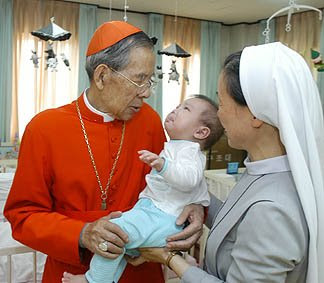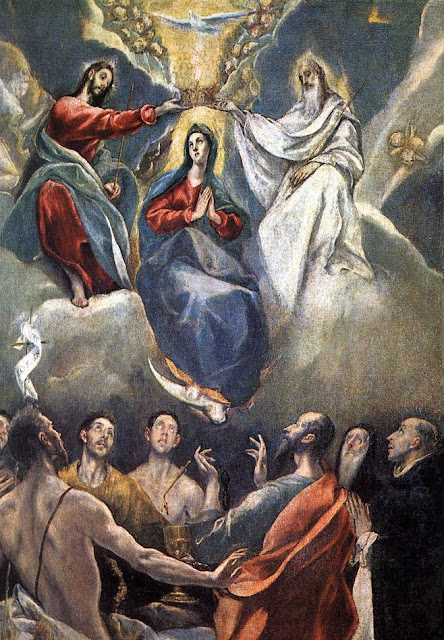The Good Samaritan (after Delacroix), Van Gogh [Web Gallery of Art]
You shall love your neighbour as yourself (Mt 22:39).
Readings
(New American Bible:
Philippines, USA)
Readings
(Jerusalem Bible: Australia,
England & Wales, India [optional], Ireland, New Zealand, Pakistan,
Scotland, South Africa)
Gospel Matthew 22:34-40 (New Revised Standard Version, Anglicised CatholicEdition)
When the Pharisees heard that Jesus had silenced
the Sadducees, they gathered together, and one of them, a lawyer, asked him a question to
test him. ‘Teacher,
which commandment in the law is the greatest?’ He said to him, ‘“You shall love the Lord your God
with all your heart, and with all your soul, and with all your mind.” This is the greatest and first commandment. And a second is like it: “You shall love your
neighbour as yourself.” On these two commandments hang all the law and the
prophets.’
Stephen Cardinal Kim Sou-hwan
Archbishop of Seoul (1922 - 2009)
This time three years ago I visited Korea to attend the ordination to the priesthood on 1 November of Fr Lee
Jehoon Augustine, a Columban who spent two years working in the Manila area as
part of his preparation for the priesthood. He is now serving in Myanmar.
While there I went
with two Columban priests, Fr Liam O'Keeffe, a classmate from County Clare,
Ireland, Fr Con Murphy from County Cork, Ireland, who has been in Korea
for more than 50 years, and a woman named Pia to visit the graves of five Columbans
in a cemetery owned by the Archdiocese of Seoul, but outside both the city and
the archdiocese. One of the five Columbans buried there, Fr Mortimer
Kelly from Gort, County Galway, was a classmate of Father Liam and myself. Pia
had known Fr John Nyhan, from Kilkenny, Ireland, another of the five, since her childhood.
The cemetery is on
hillsides, as is the Korean custom. A little higher on the hill where my
companions are buried is the grave of Stephen Cardinal Kim Sou-hwan, a man who
was revered in Korea, not only by Catholics but by nearly all South Koreans.
While we were there Father
Con told me of a homily that Cardinal Kim once preached at a Mass in a Catholic
university. He took out two daily newspapers and began to speak in such a quiet
voice that those present had to strain forward and 'eavesdrop'. Cardinal Kim
was flipping over the pages of both newspapers and some were thinking he was
unprepared. Then he came to a particular story about young women working on the
railways who collected fares of last-minute passengers and helped 'push' people
into trains at rush hour.
The report in both papers
was about accusations by higher authorities that some of these young women were
perhaps pocketing some of the fares. Cardinal Kim's voice grew stronger as he
spoke about this. Then he began to remind the students of how privileged they
were, getting higher education and an opportunity to find better jobs than the
young women working for the rail company who were at the bottom of the heap.
Cardinal Kim, who was noted for his love for the poor and who knew many
poor people personally, now speaking in a very strong voice, asked the students if they
were going to treat others with the contempt that some showed towards the young
women in a menial job or if they were going to use their professional
qualifications in the service of others.
Cardinal Kim
In that homily the late Archbishop of Seoul was
bringing together the two Great Commandments that Jesus gives us in today's
gospel and between which there is no conflict. In the First Reading, to which
the Gospel is linked by theme, God reminds the Hebrew people of how they are to
treat those who are poor or different - aliens, widows, orphans. If
you take your neighbor’s cloak in pawn, you shall restore it before the sun
goes down. That cloak was what a person particularly a poor person, slept
in.
In other words, Jesus is asking us to see each
person through his eyes. GK Chesterton in one of his biographies, maybe that of
St Francis of Assisi or of St Thomas Aquinas, has a wonderful image of a huge
crowd looking up at God on a balcony, rather as in St Peter's Square when the
Pope is on the balcony there or at his window for the Sunday Angelus. However,
Chesterton didn't see himself among the crowd but with God on the balcony,
looking down on the people and seeing them as God sees them.
Cardinal Kim was doing something similar. He was
looking at both the university students and the railway workers through the
eyes of God. Rank means nothing to God as he looks on his children. As Psalm
149 so beautifully expresses it, God takes delight in his people [Grail
translation].
I don't have my copy of the Handbook of the
Legion of Mary with me but in it members are told to look upon each
person they meet as higher than themselves. The Legion was
born in the slums of Dublin in 1921 and to this day is involved to a large
degree in serving people who have little or nothing.
God is constantly blessing the Church and the world through persons who embody the Gospel in their lives. I know from my friends in Korea in particular that Cardinal Kim was an embodiment of the Two Great Commandments, an embodiment of what each of us is called to be in virtue of our baptism in the different situations in which we find ourselves.
God is constantly blessing the Church and the world through persons who embody the Gospel in their lives. I know from my friends in Korea in particular that Cardinal Kim was an embodiment of the Two Great Commandments, an embodiment of what each of us is called to be in virtue of our baptism in the different situations in which we find ourselves.
Cardinal Kim's grave
A Columban
colleague who is a published poet and has taught at a university in Seoul, Fr
Kevin O'Rourke, captured something of the grace that Cardinal Kim was and still
is, not only to the Church in Korea, but to the Church throughout the world, in
a poem he wrote after the death of the Cardinal.
Dust of snow,
a wind that chills to the bone,
pinched mourning faces,
collars raised, hats pulled low,
the shiver of death everywhere.
Cardinal Kim Suhwan
is lowered to his final resting place.
He brought forth simplicity,
a water simplicity that quickened
every root it touched.
He brought forth patience,
a medicament patience that salved
the wounds of the poor.
He brought forth compassion,
a loving compassion that embraced the world.
Simplicity, patience, compassion,
these three:
timber for a master carpenter,
clay for a master potter,
the hub of a master priest’s wheel.
“If you bring forth what is inside,
what you bring forth will save.”
a wind that chills to the bone,
pinched mourning faces,
collars raised, hats pulled low,
the shiver of death everywhere.
Cardinal Kim Suhwan
is lowered to his final resting place.
He brought forth simplicity,
a water simplicity that quickened
every root it touched.
He brought forth patience,
a medicament patience that salved
the wounds of the poor.
He brought forth compassion,
a loving compassion that embraced the world.
Simplicity, patience, compassion,
these three:
timber for a master carpenter,
clay for a master potter,
the hub of a master priest’s wheel.
“If you bring forth what is inside,
what you bring forth will save.”


















